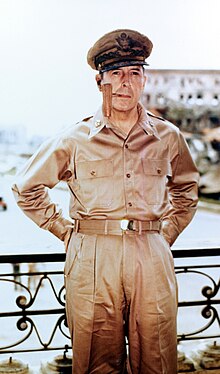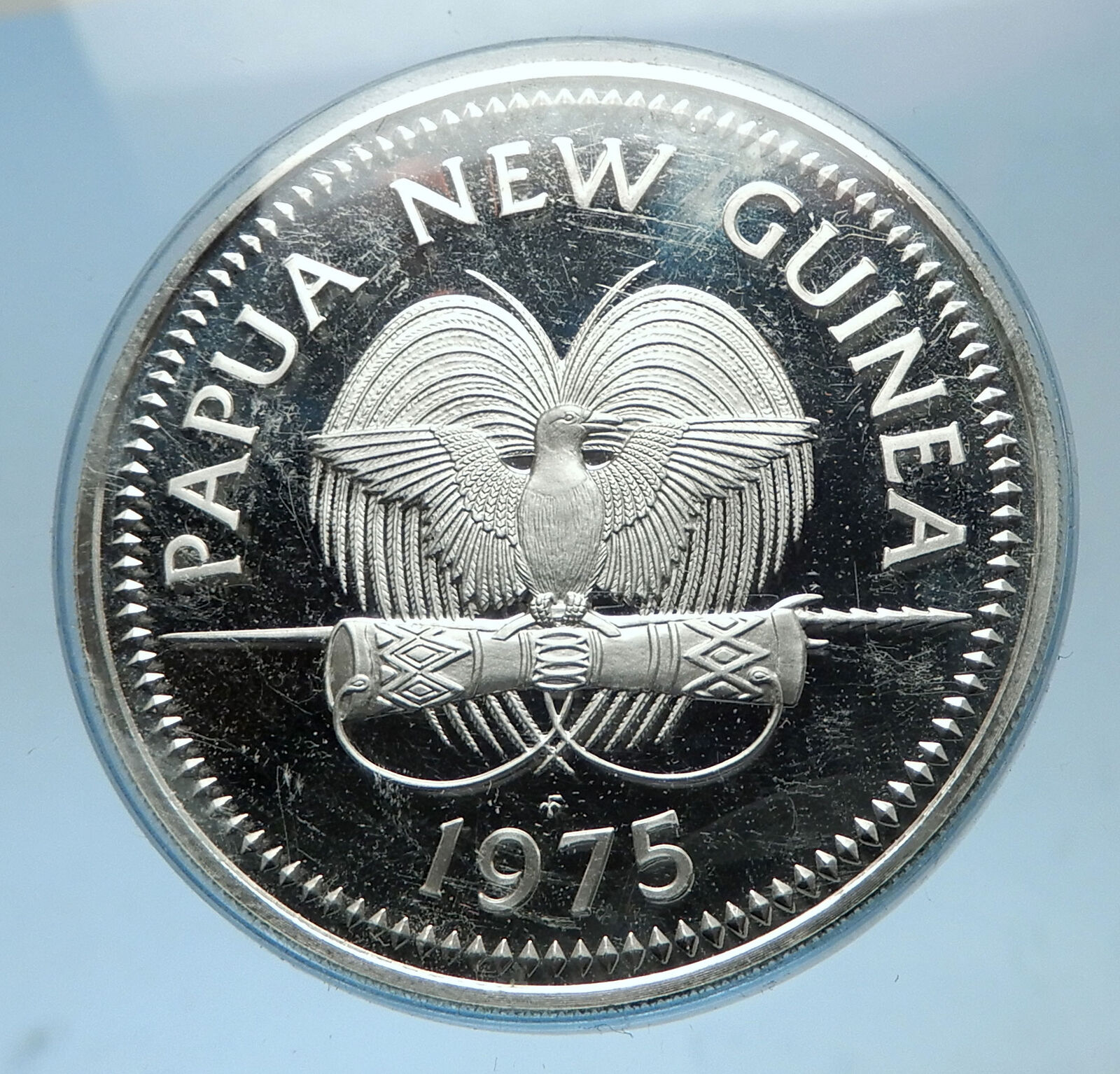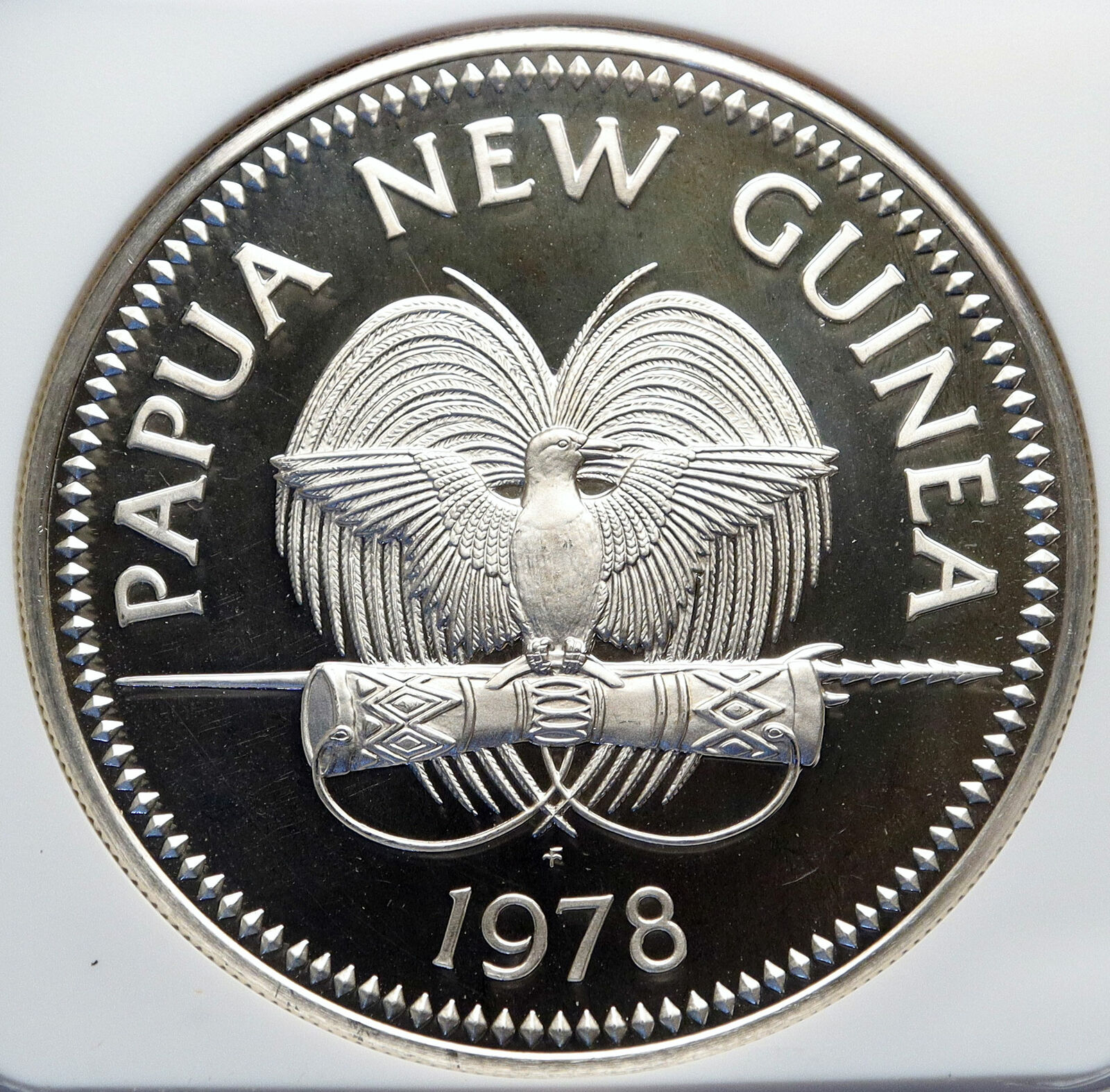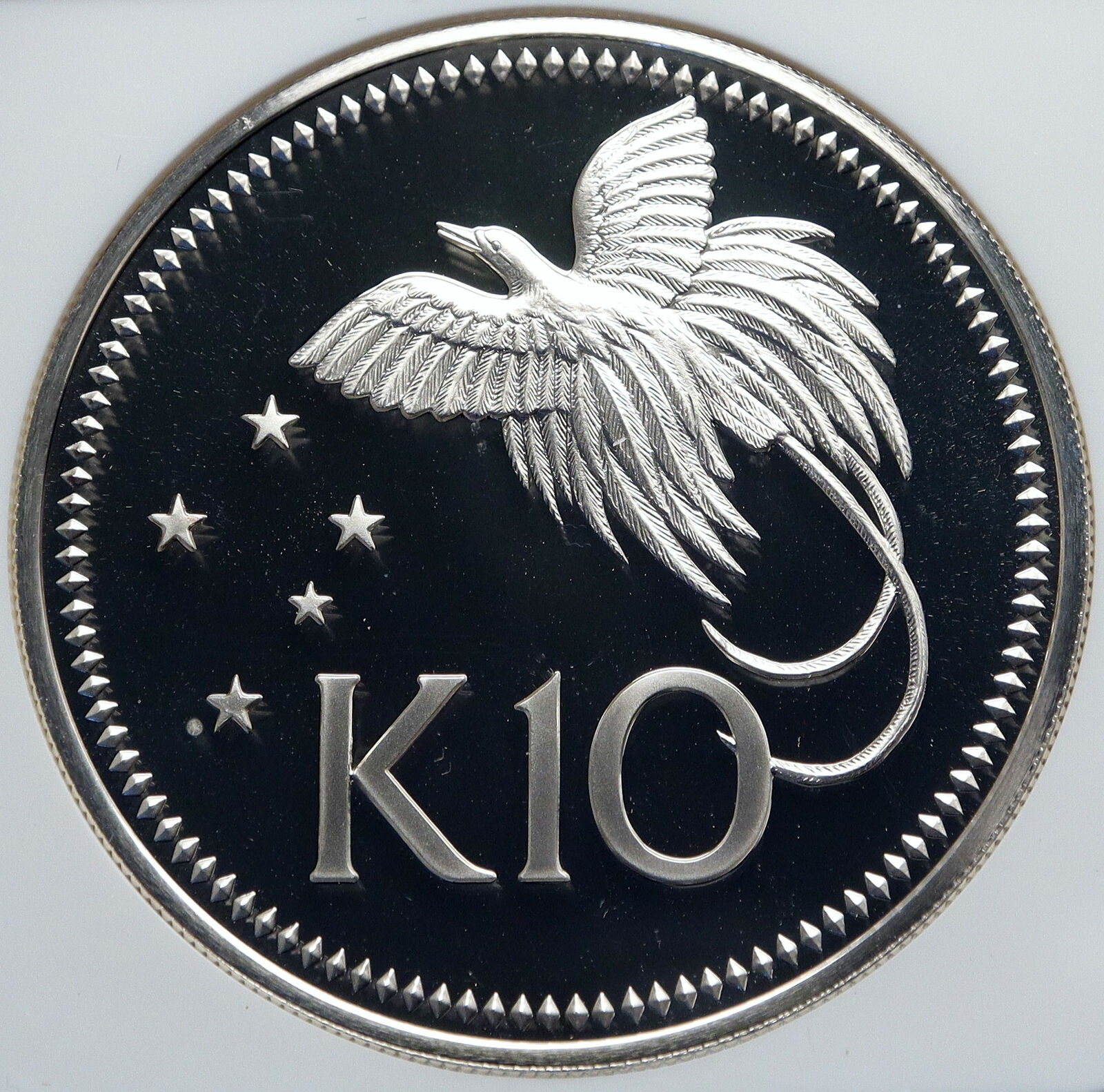|
Niue – Defender of Freedom – General Douglas MacArthur
1989 Proof Silver 50 Dollars 38.8mm (32.10 grams) .999 Silver (0.9999 oz. ASW)
Reference: KM# 34
NIUE, Crowned arms within sprigs.
GENERAL DOUGLAS MacARTHUR . DEFENDER OF FREEDOM 50 DOLLARS “OLD SOLDIERS NEVER DIE”, Head of General Douglas MacArthur 3/4 left, 5 stars at left.
You are bidding on the exact item pictured, provided with a Certificate of Authenticity and Lifetime Guarantee of Authenticity.
 Douglas MacArthur (26 January 1880 – 5 April 1964) was an American five-star general and Field Marshal of the Philippine Army. He was Chief of Staff of the United States Army during the 1930s and played a prominent role in the Pacific theater during World War II. He received the Medal of Honor for his service in the Philippines Campaign, which made him and his father Arthur MacArthur Jr. the first father and son to be awarded the medal. He was one of only five to rise to the rank of General of the Army in the US Army, and the only one conferred the rank of field marshal in the Philippine Army. Douglas MacArthur (26 January 1880 – 5 April 1964) was an American five-star general and Field Marshal of the Philippine Army. He was Chief of Staff of the United States Army during the 1930s and played a prominent role in the Pacific theater during World War II. He received the Medal of Honor for his service in the Philippines Campaign, which made him and his father Arthur MacArthur Jr. the first father and son to be awarded the medal. He was one of only five to rise to the rank of General of the Army in the US Army, and the only one conferred the rank of field marshal in the Philippine Army.
Raised in a military family in the American Old West, MacArthur was valedictorian at the West Texas Military Academy, and First Captain at the United States Military Academy at West Point, where he graduated top of the class of 1903. During the 1914 United States occupation of Veracruz, he conducted a reconnaissance mission, for which he was nominated for the Medal of Honor. In 1917, he was promoted from major to colonel and became chief of staff of the 42nd (Rainbow) Division. In the fighting on the Western Front during World War I, he rose to the rank of brigadier general, was again nominated for a Medal of Honor, and was awarded the Distinguished Service Cross twice and the Silver Star seven times.
From 1919 to 1922, MacArthur served as Superintendent of the U.S. Military Academy at West Point, where he attempted a series of reforms. His next assignment was in the Philippines, where in 1924 he was instrumental in quelling the Philippine Scout Mutiny. In 1925, he became the Army’s youngest major general. He served on the court martial of Brigadier General Billy Mitchell and was president of the American Olympic Committee during the 1928 Summer Olympics in Amsterdam. In 1930, he became Chief of Staff of the United States Army. As such, he was involved in the expulsion of the Bonus Army protesters from Washington, D.C. in 1932, and the establishment and organization of the Civilian Conservation Corps. He retired from the US Army in 1937 to become Military Advisor to the Commonwealth Government of the Philippines.
MacArthur was recalled to active duty in 1941 as commander of United States Army Forces in the Far East. A series of disasters followed, starting with the destruction of his air forces on 8 December 1941, and the invasion of the Philippines by the Japanese. MacArthur’s forces were soon compelled to withdraw to Bataan, where they held out until May 1942. In March 1942, MacArthur, his family and his staff left nearby Corregidor Island in PT boats and escaped to Australia, where MacArthur became Supreme Commander, Southwest Pacific Area. Upon his arrival, MacArthur gave a speech in which he famously promised “I shall return” to the Philippines. After more than two years of fighting in the Pacific, he fulfilled that promise. For his defense of the Philippines, MacArthur was awarded the Medal of Honor. He officially accepted Japan’s surrender on 2 September 1945 aboard USS Missouri anchored in Tokyo Bay, and oversaw the occupation of Japan from 1945 to 1951. As the effective ruler of Japan, he oversaw sweeping economic, political and social changes. He led the United Nations Command in the Korean War with initial success; however, the controversial invasion of North Korea provoked Chinese intervention. Following a series of major defeats he was removed from command by President Harry S. Truman on 11 April 1951. He later became chairman of the board of Remington Rand.
  Niue is an island country in the South Pacific Ocean, 2,400 kilometres (1,500 mi) northeast of New Zealand, east of Tonga, south of Samoa, and west of the Cook Islands. Niue’s land area is about 261 square kilometres (101 sq mi) and its population, predominantly Polynesian, was about 1,600 in 2016. The island is commonly referred to as “The Rock”, which comes from the traditional name “Rock of Polynesia”. Niue is one of the world’s largest coral islands. The terrain of the island has two noticeable levels. The higher level is made up of a limestone cliff running along the coast, with a plateau in the centre of the island reaching approximately 60 metres (200 feet) high above sea level. The lower level is a coastal terrace approximately 0.5 km (0.3 miles) wide and about 25-27 metres (80-90 feet) high, which slopes down and meets the sea in small cliffs. A coral reef surrounds the island, with the only major break in the reef being in the central western coast, close to the capital, Alofi. A notable feature are the many limestone caves near the coast. Niue is an island country in the South Pacific Ocean, 2,400 kilometres (1,500 mi) northeast of New Zealand, east of Tonga, south of Samoa, and west of the Cook Islands. Niue’s land area is about 261 square kilometres (101 sq mi) and its population, predominantly Polynesian, was about 1,600 in 2016. The island is commonly referred to as “The Rock”, which comes from the traditional name “Rock of Polynesia”. Niue is one of the world’s largest coral islands. The terrain of the island has two noticeable levels. The higher level is made up of a limestone cliff running along the coast, with a plateau in the centre of the island reaching approximately 60 metres (200 feet) high above sea level. The lower level is a coastal terrace approximately 0.5 km (0.3 miles) wide and about 25-27 metres (80-90 feet) high, which slopes down and meets the sea in small cliffs. A coral reef surrounds the island, with the only major break in the reef being in the central western coast, close to the capital, Alofi. A notable feature are the many limestone caves near the coast.
Niue is a self-governing state in free association with New Zealand, and New Zealand conducts most diplomatic relations on its behalf. Niueans are citizens of New Zealand, and Queen Elizabeth II is head of state in her capacity as Queen of New Zealand. Between 90% and 95% of Niuean people live in New Zealand, along with about 70% of the speakers of the Niuean language. Niue is a bilingual country, with 30% of the population speaking both Niuean and English. The percentage of monolingual English-speaking people is only 11%, while 46% are monolingual Niuean speakers.
Niue is not a member of the United Nations (UN), but UN organisations have accepted its status as a freely-associated state as equivalent to independence for the purposes of international law. As such, Niue is a member of some UN specialised agencies (such as UNESCO, and the WHO), and is invited, alongside the other non-UN member state, the Cook Islands, to attend United Nations conferences open to “all states”. Niue has been a member of the Pacific Community since 1980.
Niue is subdivided into 14 villages (municipalities). Each village has a village council that elects its chairperson. The villages are at the same time electoral districts; each village sends an assemblyperson to the Parliament of Niue. A small and democratic nation, Niueans hold legislative elections every 3 years.
The Niue Integrated Strategic Plan (NISP), adopted in 2003, is the national development plan, setting national priorities for development in areas such as financial sustainability. Since the late 20th century Niue has become a leader in green growth; the European Union is helping the nation convert to renewable energy. In January 2004, Niue was hit by Cyclone Heta, which caused extensive damage to the island, including wiping out most of South Alofi. The disaster set the island back about two years from its planned timeline to implement the NISP since national efforts concentrated on recovery.
|





 Douglas MacArthur (26 January 1880 – 5 April 1964) was an American five-star general and Field Marshal of the Philippine Army. He was Chief of Staff of the United States Army during the 1930s and played a prominent role in the Pacific theater during World War II. He received the Medal of Honor for his service in the Philippines Campaign, which made him and his father Arthur MacArthur Jr. the first father and son to be awarded the medal. He was one of only five to rise to the rank of General of the Army in the US Army, and the only one conferred the rank of field marshal in the Philippine Army.
Douglas MacArthur (26 January 1880 – 5 April 1964) was an American five-star general and Field Marshal of the Philippine Army. He was Chief of Staff of the United States Army during the 1930s and played a prominent role in the Pacific theater during World War II. He received the Medal of Honor for his service in the Philippines Campaign, which made him and his father Arthur MacArthur Jr. the first father and son to be awarded the medal. He was one of only five to rise to the rank of General of the Army in the US Army, and the only one conferred the rank of field marshal in the Philippine Army. 
 Niue is an island country in the South Pacific Ocean, 2,400 kilometres (1,500 mi) northeast of New Zealand, east of Tonga, south of Samoa, and west of the Cook Islands. Niue’s land area is about 261 square kilometres (101 sq mi) and its population, predominantly Polynesian, was about 1,600 in 2016. The island is commonly referred to as “The Rock”, which comes from the traditional name “Rock of Polynesia”. Niue is one of the world’s largest coral islands. The terrain of the island has two noticeable levels. The higher level is made up of a limestone cliff running along the coast, with a plateau in the centre of the island reaching approximately 60 metres (200 feet) high above sea level. The lower level is a coastal terrace approximately 0.5 km (0.3 miles) wide and about 25-27 metres (80-90 feet) high, which slopes down and meets the sea in small cliffs. A coral reef surrounds the island, with the only major break in the reef being in the central western coast, close to the capital, Alofi. A notable feature are the many limestone caves near the coast.
Niue is an island country in the South Pacific Ocean, 2,400 kilometres (1,500 mi) northeast of New Zealand, east of Tonga, south of Samoa, and west of the Cook Islands. Niue’s land area is about 261 square kilometres (101 sq mi) and its population, predominantly Polynesian, was about 1,600 in 2016. The island is commonly referred to as “The Rock”, which comes from the traditional name “Rock of Polynesia”. Niue is one of the world’s largest coral islands. The terrain of the island has two noticeable levels. The higher level is made up of a limestone cliff running along the coast, with a plateau in the centre of the island reaching approximately 60 metres (200 feet) high above sea level. The lower level is a coastal terrace approximately 0.5 km (0.3 miles) wide and about 25-27 metres (80-90 feet) high, which slopes down and meets the sea in small cliffs. A coral reef surrounds the island, with the only major break in the reef being in the central western coast, close to the capital, Alofi. A notable feature are the many limestone caves near the coast. 




